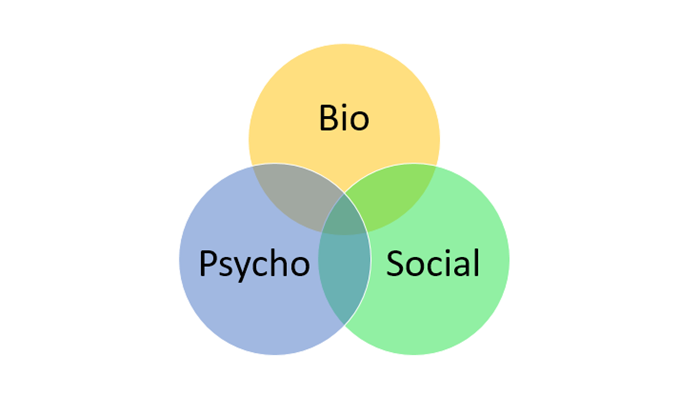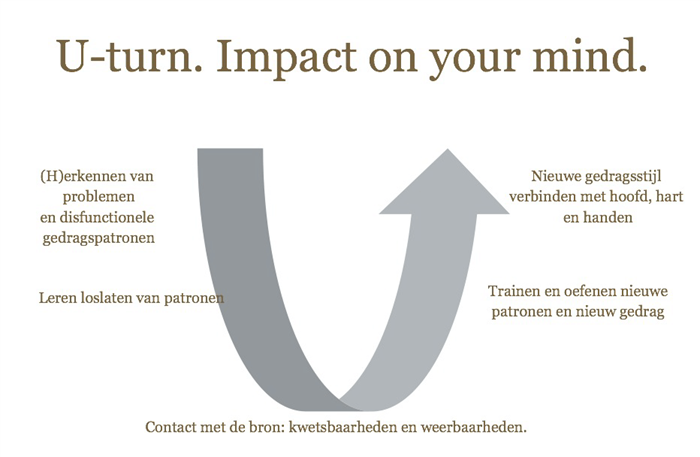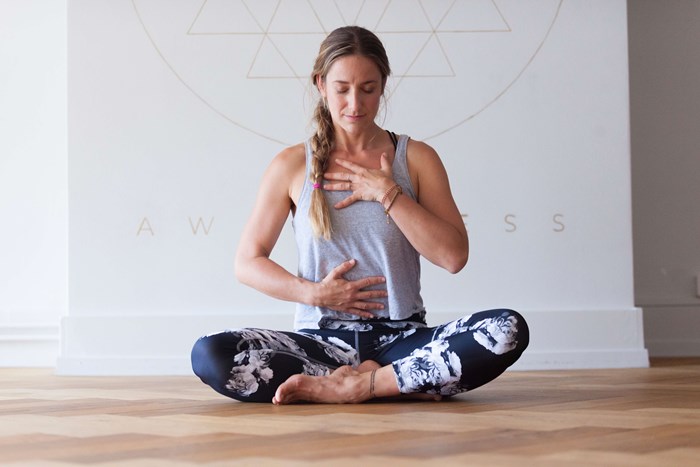Treatment
U-center has an extensive treatment offer
Based on a solid theoretical and scientific background U-center offers a range of therapies, methodologies, interventions and treatments. These are offered alternately at both individual and group level. Attention is paid to psychological, physical and social well-being.
Based on a solid theoretical and scientific background U-center offers a range of therapies, methodologies, interventions and treatments. These are offered alternately at both individual and group level. Attention is paid to psychological, physical and social well-being.

The theoretical basis
What is the biopsychosocial model?
The biopsychosocial model is based on the idea that problems and disorders are caused by a combination of biological (including medical), psychological and social factors:
- Biological factors are genetic vulnerability, your constitution, state of health and whether you are taking medication or (mis)using any substances.
- Psychological factors concern personality, coping styles and whether you have suffered trauma (PTSD).
- Social factors which are taken into account include relationships, family and work, your hobbies and daily activities, as well as your financial and domestic situation.
We consider all these factors and clarify the relationships between the different factors to develop a holistic theory that serves as a starting point for your treatment plan. Your treatment plan, which is largely tailor-made to your personal situation and needs, sets out your goals and related treatment.


What is U Theory?
U Theory was originally developed as a change management method for leaders, civil servants and managers. It involves a process model for renewal and transformation. By connecting with yourself and others, you make a profound journey to bring about significant change.
Making your U-turn at U-center
At U-center we have adapted this model to our own U-turn. The U-turn in the diagram describes the process you go through during treatment. The left arm of the U represents the process you go through during residential treatment until just after the upward curve. The right arm relates to the outpatient phase when you put into practice the insights, skills and behavioural patterns you have learnt, at home and at work.
Treatment formats
U-center uses scientifically proven, evidence-based methods as well as practice-based treatment that has proven to be effective in practice. The following treatments can be offered individually and some can also be offered in group sessions.
- Group sessions (transdiagnostic treatments aimed at learning new skills, insights, group dynamics, interaction with others, insights into behavioural patterns)
- Individual sessions (focused on specific conditions diagnosed, therapies use evidence-based protocols)
- Lifestyle change (important to prevent a relapse of psychological conditions, to maintain gains made during treatment and to stimulate healthy future development)
- Systems therapy (with family, friends and work)
Methods
Psychoeducation
It is important to start with psychological education, because this provides you with a theoretical base for treatment. We explain your condition(s), behavioural patterns (schemas) and the types of treatment we offer. For example, you might learn about addiction and the effects of substances like alcohol, drugs or medication on your brain.
Cognitive Behavioural Therapy (CBT)
Cognitive Behavioural Therapy is a psychotherapy that helps you learn, primarily through practice, to view difficult situations in a different way in order to cope with them in a different manner. We discuss and consider the behaviour and thoughts that are maintaining your problems. Scientific research shows that cognitive behavioural therapy is effective. Treatments are complaint or problem-focused and usually short-term.
Mindfulness-based Cognitive Behavioural Therapy (MBCT)
MBCT is a type of cognitive behavioural therapy that helps you to live more consciously in the present using, among others, different meditation techniques. By becoming aware and letting go of automatic reactions and judgments, it is possible to reach inner peace.
Short-term psychodynamic psychotherapy (in-depth psychotherapy)
With psychodynamic psychotherapy, you research the background and meaning behind the psychological problems which are interfering with your daily functioning and relationships with others. In order to understand and change repetitive thought patterns, emotions and behaviour, your life history is important as well as how you are functioning now. What do your complaints mean? Having insight into your conscious and unconscious motives can help you change your behaviour and start to feel better.
Acceptance and Commitment Therapy (ACT)
ACT is a form of cognitive behavioural therapy. You learn to focus your attention on things that you can influence directly, such as your own behaviour, instead of trying to gain control over experiences that you cannot influence directly, such as emotions and thoughts. Through repeated practice, you create space in your mind to focus on matters which are really important to you. This implies an acceptance-oriented attitude towards these emotions and thoughts. The ultimate goal of ACT is that you can cope with life’s problems in a more flexible way, and thus lead a valuable and vital life.
Schema-focused therapy / Schema therapy
Schema-focused therapy is a form of psychotherapy for people with mental disorders, such as personality disorder or frequently recurring depression. Schema therapy helps you to understand and change the origins of behavioural patterns by examining how experiences from your childhood influence your patterns and daily life. You learn to change yourself so that you start to feel better, and can stand up for and take better care of yourself. You learn to feel what you need and to stand up for this in a healthier way. This not only changes your behaviour, but also your thoughts and feelings.
Mentalization-based Treatment (MBT)
Mentalization means that you can understand and explain your own behaviour and that of others from underlying feelings, thoughts, needs and motivation. Symptoms of mental illness, social and interpersonal functioning and personality problems improve considerably when you train and further develop this mentalization.
Eye Movement Desensitization and Reprocessing (EMDR)
EMDR is a technique that is often used for people who have suffered a trauma. Thoughts and emotions are detached from the event itself by overloading the capacity of the working memory.
Body-oriented therapies
- Physiotherapy and vitality management
- Movement therapy
- Body-oriented therapy
- Energy and balance (yoga)
- Relaxation therapy
- Chronotherapy (light therapy)


Emotional expression
- Musical expression
By making or listening to music you can express your emotions and thoughts. That is why there is a piano for free use at both locations of U-center and clients are allowed to bring and practice their own musical instrument during their stay at U-center.
- Art classes
The aim of creative lessons is to reinforce a process of change by visual means such as drawing, painting, modelling or sculpture. The lessons are experiential. You are guided to create something that has emotional meaning for you with your own hands and make it tangible.
- Drama therapy
- Oxygen for the soul
With the help of theater and musical exercises you learn to use your body and your voice as an instrument to express yourself more easily. The sessions release a lot of tension and emotion, and set new behaviour in motion.
Specific training
- Competitive Memory Training (COMET)
COMET is a behavioural therapy that helps you improve your self-image and self-esteem.
- Emotional Regulation Disorder (ERD) skills training
- Substance refusal training
- Social skills training
In this training, you learn to improve your social skills and communication with the help of sepcific exercises and tips.

Relapse prevention and ongoing development
Recovery is only a small part of the treatment. Together we will do everything we can to prevent relapse and to enable you to continue developing yourself after you have left U-center. We have included a number of interventions for this in the treatment.
Relapse prevention (group)
Relapse prevention is part of cognitive behavioural therapy. You learn to recognize the warning signs of a potential relapse of psychological complaints and / or addiction more quickly, and we provide suggestions on what to do to prevent relapse or make it less serious.
Personal Development Plan (PDP)
Using this plan we work on options to put what you have learned during treatment into practice, and further develop it in the future, so that you maintain greater control over your own life.
Self-help groups
Under the guidance of a therapist, speakers and former clients are invited to share their knowledge and experience with clients. For example, former clients share their experiences after their treatment at U-center, and how they continued to work on their change process on returning home.
Lifestyle change
Learn how to take care of yourself again. A positive lifestyle change brings you a lot - better health and more energy and vitality.

Medication
Pharmacotherapy is a treatment with medication that can potentially be prescribed to support your psychological treatment. This therapy can include newly prescribed medication, and also repeat prescriptions or the reduction of medication you are already taking.
System therapies
Working on yourself and e-health
- Working on yourself: exercises / self-study / self-care / homework
- Writing a diary
- E-health via ‘My U-Center’ online portal

